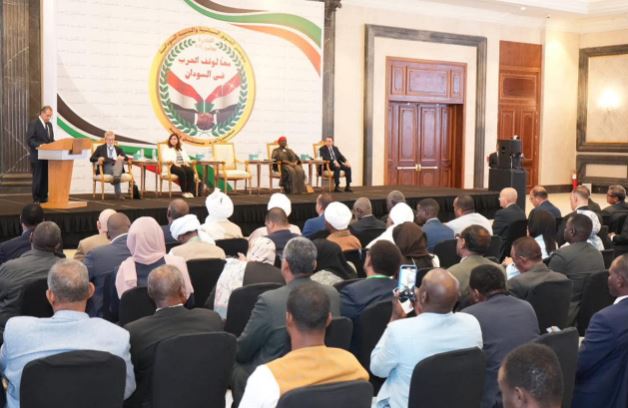Rival Sudanese political factions met in the Egyptian capital, Cairo, on Saturday with the Democratic Bloc, allied with the Sudan Armed Forces (SAF), refusing to hold joint meetings with the Sudanese Coordination of Civil Democratic Forces also known as Tagadum, faulted for empathizing with the Rapid Support Forces (RSF).
The main belligerents, SAF and the RSF, did not participate in the talks. The political factions sat separately at the meeting organized by Egypt, indicating the deep divide.
While the two parties agreed to form a subcommittee to issue a communiqué calling for an end to hostilities, three Democratic Bloc leaders, including Federal Finance Minister Jibril Ibrahim, Darfur Region Governor Minni Minawi, and Sovereign Council Deputy Chairman Malik Agar, refused to sign the statement.
“We told the Egyptians not to have high ambitions for this meeting,” said Ibrahim.
He emphasized that a ceasefire was unrealistic without the RSF’s withdrawal from civilian areas and the cessation of support for the RSF by some regional actors.
The head of Tagadum, Former Prime Minister Abdalla Hamdok, rejected accusations of the coalition’s ties to the RSF and stated his willingness to meet with the army.
“A crisis this complicated and deep is not expected to end in one meeting… The lesson is for us to be patient and to build on anything positive that comes out of it,” he said.
According to the UN and independent observers, the war which erupted on 15 April 2023 between SAF and the RSF led by former deputy chairman of the Sudanese Sovereign Council Mohammed Hamdan Dagalo, has resulted in the killing of over 15,000 civilians and the displacement of nearly 10 million people, triggered famine warnings, and fueled waves of ethnically motivated violence largely blamed on the RSF.
The Cairo talks are one of numerous overlying initiatives to end the Sudan war. The African Union has also called for a meeting next week.
Relatedly, the Sudanese Communist Party (SCP) refused to participate in the Cairo Conference, emphasizing the importance of a Sudanese solution to the national crisis and rejecting external interventions.
In a statement from its political bureau, the party expressed gratitude and appreciation for Egypt’s efforts to help the Sudanese people overcome their plight by stopping the war and providing humanitarian aid to those affected in displacement camps and refugee centers. Nevertheless, the party apologized for not attending the conference in Cairo.
Kamal Karrar, a party Central Committee member, said the party, in light of the December 2018 revolution, highlights that it encompassed all parts of Sudan from cities and villages to the countryside.
“The revolution raised the slogan ‘Freedom, Peace, and Justice’ as a popular choice to solve the country’s general crisis,” he stated. “The party confirms that the people’s choice for the revolution was a rejection of the soft-landing project led by the United States and its allies in the region, which aims to solve the Sudanese crisis within the same economic and social policies that have prevailed since independence.”
Karrar explained that the October 2021 coup and the outbreak of war in April 2023 are manifestations of the renewed factors of the general crisis in Sudan, resulting from the transitional governments’ deviation from the path of the revolution and abandoning the implementation of its slogans and goals in dismantling and liquidating the National Congress Party (Al-Ingaz) regime.
He accused these governments of following new liberalism policies and free market practices, which entrenched external dependency and deepened the crisis.
The background of the SCP’s stance on foreign conferences and initiatives stems from a long history of skepticism towards the intentions of external parties. The party believes that many of these initiatives aim to achieve economic and geopolitical interests at the expense of Sudanese sovereignty.
Since the fall of the Al-Bashir regime in 2019, the SCP has strongly opposed any initiative that does not consider the national priorities and democratic aspirations of the Sudanese people. The party views external interventions as often biased towards certain parties in the conflict, contributing to complicating the crisis rather than solving it. It has consistently raised issues concerning humanitarian aid, emphasizing the importance of delivering it neutrally and without political influence to those affected in displacement camps and shelter centers.
The party criticized the excessive reliance on externally imposed economic solutions, which often fail to consider the actual needs of the Sudanese people and lead to increased economic dependency.
In its statement, the SCP called for comprehensive strategies to manage ethnic and cultural diversity in Sudan in a manner that ensures justice and equality among all components and halts military interventions.
The party reiterated the necessity to stop foreign military interventions that contribute to fueling internal conflicts and increasing the suffering of the Sudanese people.




